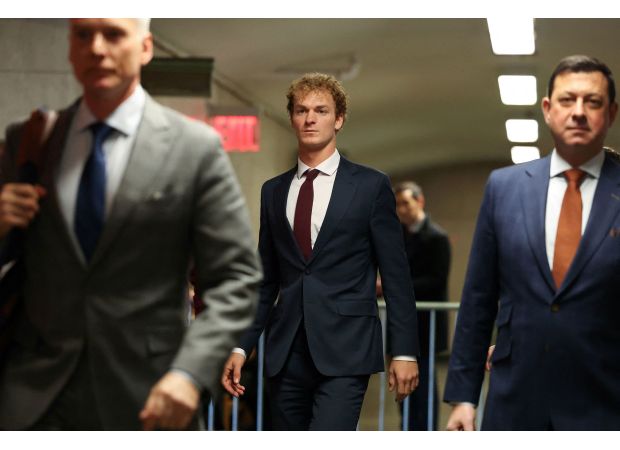Former Marine found not guilty in US court for the death of a man he put in a chokehold on a subway.
Daniel Penny cleared of manslaughter charge due to lack of evidence.

In a highly anticipated verdict, a Manhattan jury has found Daniel Penny not guilty of criminally negligent homicide in the death of Jordan Neely on a New York City subway last year. The trial has been ongoing for weeks, with Penny also facing a more serious second-degree manslaughter charge. However, in a surprising turn of events, the judge dismissed the charge on Friday at the request of prosecutors after the jury was unable to come to a verdict twice. This decision was met with applause in the courtroom as Penny locked eyes with the jurors who had just acquitted him, nodding in appreciation with a visible smile on his face.
Neely's father, who was present in the courtroom for the verdict, could not contain his emotions and was escorted out after an outburst filled with expletives. The jury had deliberated for just over an hour on the criminally negligent homicide charge and for 16 hours last week on the second-degree manslaughter charge before declaring they were deadlocked. This case has been highly controversial and has sparked polarising opinions among city residents. It has also raised important questions about mental health, race relations, and the responsibilities of those who try to protect others.
The case revolves around the tragic death of Neely, a 30-year-old street artist who struggled with homelessness, mental illness, and drug addiction. On May 1, 2023, Neely entered a subway car, acting erratically and causing a disturbance. Witnesses reported seeing him throw down his jacket and yell at passengers, stating that he was hungry and thirsty and didn't care if he died. Penny, who was a passenger on the same train, grabbed Neely from behind in a chokehold and restrained him on the train floor for several minutes. When he released the hold, Neely was unresponsive and was later declared dead.
The incident was caught on bystander video and has been played repeatedly in court during the trial. This evidence has further fuelled the debate surrounding the case, with some praising Penny for trying to protect others while others believe he acted recklessly and negligently. The Black Lives Matter movement has also added Neely's name to its list of victims and has held protests outside the courthouse. On the other hand, Penny's defence has argued that he was acting to protect himself and others from a perceived threat.
In closing arguments, prosecutor Dafna Yoran asserted that Penny used excessive force and acted recklessly and negligently in restraining Neely for such a long time, even after he stopped moving. On the other hand, Penny's defence has maintained that he was not trying to harm Neely, but rather trying to prevent him from hurting anyone else. In an interview with NYPD investigators shortly after the incident, Penny stated, "I wasn't trying to injure him. I'm just trying to keep him from hurting anybody else. He was threatening."
In addition to the conflicting stories and evidence presented in the trial, there has also been controversy surrounding the medical examiner's determination that Neely died from the chokehold. Penny's defence team has challenged this finding and suggested that the charges were brought based on something other than medical science. Outside the courtroom, Neely's father and a family attorney expressed their disappointment with the verdict and the broader criminal justice system, with Neely's father stating, "The system is rigged. I miss my son. He didn't have to go through this, and neither did I."
This case has brought to light important issues and sparked important discussions about the use of force and the responsibilities of those who try to protect others. While the verdict has been met with mixed reactions, one thing is certain – the tragic death of Jordan Neely has left a lasting impact on the community and has highlighted the need for change and improvement within the criminal justice system.
A Manhattan jury has reached a verdict in the trial of Daniel Penny, a former Marine who was charged in the death of Jordan Neely on a New York City subway last year. The jury has found Penny not guilty of criminally negligent homicide, a decision that was met with applause in the courtroom. The judge also dismissed a more serious charge of second-degree manslaughter at the request of prosecutors, as the jury had been deadlocked on that count.
Penny, who is 26 years old, would have faced up to four years in prison if convicted of criminally negligent homicide and up to 15 years for manslaughter. After the verdict was read aloud, Penny locked eyes with the jury members who acquitted him and nodded in gratitude. A smile could be seen on his face, clearly relieved by the outcome of the trial.
Neely's father, who was present in the courtroom for the verdict, reacted with an audible outburst and was escorted out of the courtroom. The jury had deliberated for just over an hour for the criminally negligent homicide charge and 16 hours for the second-degree manslaughter charge before informing the judge that they were deadlocked. The case revolved around the death of Neely, a 30-year-old street artist who struggled with homelessness, mental illness, and drug addiction.
According to witnesses, Neely entered the subway car and began acting erratically, throwing down his jacket and yelling at passengers that he was hungry and thirsty and didn't care if he died. Penny, who was a passenger on the train, responded by grabbing Neely from behind in a chokehold and restraining him on the floor for several minutes. When Penny released the hold, Neely was unresponsive and was later declared dead.
The incident was captured on bystander video and has been played repeatedly in court during the trial. It has sparked a polarizing response from city residents, with many citing personal experiences with disorder on the subways. The case has also raised broader questions about mental health, race relations, and the line between protector and vigilante. Black Lives Matter protesters have added Neely's name to their roll call of victims, while others have praised Penny for trying to protect others.
Prosecutors argued that Penny acted recklessly and negligently by using excessive force and restraining Neely in a chokehold for too long, even after he stopped moving. They stated that Penny's actions were not justified and that he should be held accountable for Neely's death. However, Penny's defense argued that he was acting to protect himself and others from a perceived threat.
In an interview with NYPD investigators shortly after the incident, Penny stated, "I wasn't trying to injure him, I'm just trying to keep him from hurting anybody else. He was threatening." His defense attorneys also questioned the medical examiner's determination that Neely died from the chokehold and suggested that the charges were brought based on a rush to judgment rather than solid medical evidence.
Outside the courtroom, Neely's father and a family attorney expressed their disappointment with the jury's verdict and the criminal justice system as a whole. Neely's father, Andre Zachary, stated, "I miss my son. My son didn't have to go through this. I didn't have to go through this either." The trial has sparked important conversations about the use of force and the treatment of individuals struggling with mental illness and homelessness.






